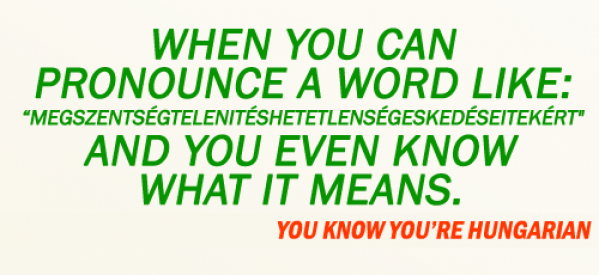N+1 random facts about the Hungarian language
- We like to multiply the sentence words.
I hadn’t recognise it until one of my foreign friends told
me that he can always identify the Hungarian language speakers from saying
„igen-igen-igen” (’yes, yes, yes’). And indeed, we do say these kinds of words
not only once, but at least twice or thrice in rapid succession. Other words we
multiply: igen (’yes’), nem (’no’), bizony (’yes, yes’), de (’yes, surely’), persze
(’of course’), jó (’okay, good’), and sometimes szia (’hi’), hová (’where’ –
„hová-hová?” means „where are you going?”).
- King = the best; pumpkin = very
If a Hungarian says that something is „király” (’king’),
this means that something is fine, very good, the best. And „tök” (’pumpkin’),
which is probably a shortened form of „tökéletesen” (’perfectly’) is the same
as „nagyon” (’very’).
For example: Tök király volt a film. (Means ’The film was
very good’, but literally ’The film was pumpkin king’.)
- A goose is silly, while a chick is stupid.
„Buta liba” (lit. ’silly goose’) and „hülye tyúk” (lit.
’stupid chick’) are phrases only used for not-so-clever women – the interesting
part is that these two became idiomatic expressions. While „hülye liba” is also
possible, „buta tyúk” sounds quite strange.
- Underground ≠ metro, subway.
Originally „földalatti” (lit. ’underground’) meant every
kind of subway. But in time „földalatti” became a synonym to the Millennium
Underground built in 1896 as the first line of the Budapest Metro. Therefore since
then for every other subway we solely use the term „metró”. („A 2-es
földalattival kell utaznia” and „a 2-es metróval kell utaznia” – „You should
take line 2” – are both correct grammatically, but only the latter makes sense
for a Hungarian.)
- Two kinds of love
The Hungarian language distinguishes between two kinds of
love. One of them is szeretet – this
is what you feel towards your family members, best friends, beloved singer and
pet. The other one is szerelem – the
feeling towards your boy/girlfriend or spouse.
- Doublets
There are many doublets (’ikerszó’) in Hungarian, such as „ugrabugrál”
(’caver, jump’), „ákombákom” (’scrawl’), „hébe-hóba” (’occasionally’), „csigabiga”
(’snail’). Sometimes the separated parts have no meaning on their own – such as
in the case of ákombákom and dínomdánom (’revel’); sometimes only one
half has meaning – like in csigabiga,
where „csiga” itself also means snail and gizgaz,
where „gaz” is weed.
Thank you for reading.
by Alla

Comments
Post a Comment